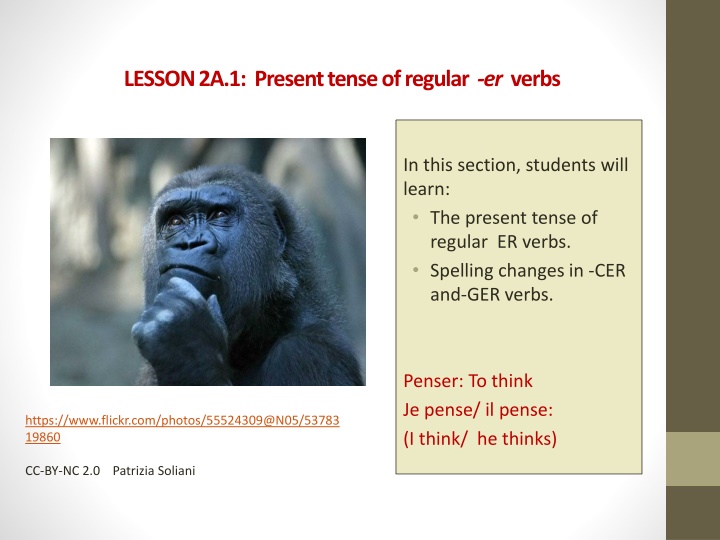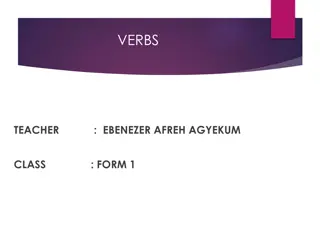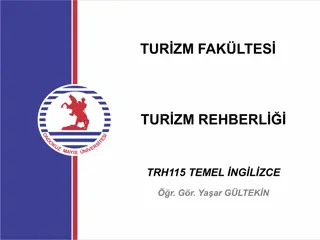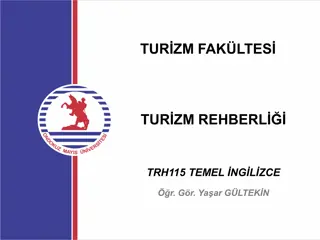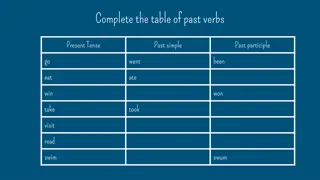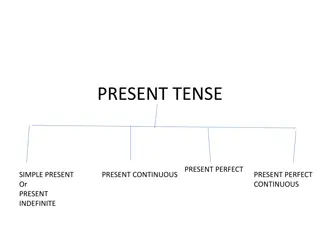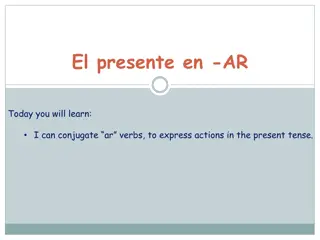Present Tense of Regular -ER Verbs in French
Learn the present tense of regular -ER verbs in French, explore conjugations, spelling changes, and verb usage. Practice with translation exercises to enhance your language skills.
Download Presentation

Please find below an Image/Link to download the presentation.
The content on the website is provided AS IS for your information and personal use only. It may not be sold, licensed, or shared on other websites without obtaining consent from the author.If you encounter any issues during the download, it is possible that the publisher has removed the file from their server.
You are allowed to download the files provided on this website for personal or commercial use, subject to the condition that they are used lawfully. All files are the property of their respective owners.
The content on the website is provided AS IS for your information and personal use only. It may not be sold, licensed, or shared on other websites without obtaining consent from the author.
E N D
Presentation Transcript
LESSON 2A.1: Present tense of regular -er verbs In this section, students will learn: The present tense of regular ER verbs. Spelling changes in -CER and-GER verbs. Penser: To think Je pense/ il pense: (I think/ he thinks) https://www.flickr.com/photos/55524309@N05/53783 19860 CC-BY-NC 2.0 Patrizia Soliani
THE VERBS -This chapter is your introduction to the regular verbs in French ending in ER, the most common ending. -Regular verbs are those that follow rules and patterns, unlike the irregular verb tre. Take a look at the conjugation of the verb PARLER -You must be familiar by now with the subject pronouns in French (Je, tu, vous, etc) and the difference between Vous and Tu. -Do you remember when you need an apostrophe J ...(J'aime...)?
About verb conjugation -The uses of the present tense in French and its differences and similarities with English. -The spelling change of verbs ending in GER (manger, voyager, partager) (French, like Spanish, must have a consistent sound throughout the conjugation. If you say Je mange the sound is consistent with the infinitive "manger". -This is not the case in the "nous" form. If, following the rules, I write Nous mangons, I'm producing a different sound (equivalent to the g in the English word gone. The only way, in French, of reproducing the same sound is by adding an e: nous mangeons) - The verb CHERCHER (to look for) does not need a preposition. Nous cherchons une rue (We are looking for a street)
The conjugation This is the conjugation of the verb Parler (to speak): Je parle tu parles . elle parle/ il parle nous parlons vous parlez Ils parlent Notice that the pronunciation is the same except for: Nous parlons vous parlez This is the same pattern you will find in French verbs in the present tense.
More about verb conjugation -The following verbs can also be used with an infinitive: adorer (J'adore le fran ais/ J'adore parler fran ais) aimer (J aime voyager= I like to travel) d tester (to dislike) -When there are two verbs together, the second must be no conjugated (infinitive): danser, chercher, etc.
Practice. Can you translate the following sentences? 1. I like to live in Boston____________________________________ 2. Pierre dislikes to watch TV_________________________________ 3. We love to eat pizza______________________________________ 4. Do you like to travel?______________________________________ Answers: 1. J aime habiter Boston 2. Pierre d teste regarder la t l vision 3. Nous adorons manger pizza 4. Tu aimes (aimes-tu) voyager?
More practice Here s a full exercise (answer below) Salut Marie: a va bien l universit ? Moi, j (1)________________(adorer) les cours. Ils sont tr s int ressants. Les profs sont sympas mais ils (2)_________________ (donner) beaucoup des devoirs. Mon camarade de chambre s appelle Jean-Pierre. Il (3)______________( tudier) les sciences politiques. Nous (4) _____________(partager) un appartement. Jean-Pierre est tr s sociable, mais il (5)_______________(aimer) mieux (better) le sport et il (6)_____________(parler) beaucoup au t l phone. Le week-end nous (8)__________________(retrouver) des amis au caf o nous (9)________________(regarder) des films la t l . Et toi, tu (10)_________________(chercher) un petit ami? Les filles (11)_____________(adorer) Jean-Pierre. Elles (12) qu il est charmant Answers: 1. J adore 2. donnent 3. tudie 4. partageons 5. travaille 6. aime 7. parle 8. retrouvons 9. regardons 10. cherches 11. adorent 12. pensent CC-BY Roger Celis
